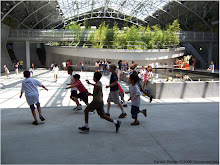
We asked museums whether they conduct research in their museum. The answer seems to be that about half of children’s museums do some kind of research. Of the museums that took our survey, 20 said they do, while 22 responded that they do not.
Of those that do some kind of research, 17 partner with universities, 10 with research consultants, 7 with professional associations, 4 with funders and with private nonprofit research organizations, and 3 with other. The research they are doing is primarily audience research, and is focused on whether exhibits are meeting their goals.
They are using research to inform exhibition themes (14), influence how they approach exhibits (16), and to edit signage to make it more effective (10). Only a few museums explicitly tell their visitors about the research, their findings, and why it matters – 5 do so in their newsletter and 2 host lectures.
What emerges from this answer is that most children’s museums are not conducting research into new scientific questions about child development, or informal learning, for example.Chicago Children's Museum, in the Skyline exhibit, is researching how exhibits can better support informal science learning, parent/child social learning, and the role of design as a scaffold for visitor behavior. And the Boston Children's Museum has the Playlab. A number of science museums do host university research departments in exactly this way – for example, the Museum of Science in Boston has a space set aside for graduate students. I have written about both Boston Children's Museum and the Museum of Science on this blog recently.
I recently saw that the Minnesota Children’s Museum is launching a new initiative that may be moving in this direction as well. Children’s Museums strike me as a perfect place to push forward our collective understanding of self-choice, informal, and social learning. It will be interesting to see if this opportunity is embraced by more museums in the future.






No comments:
Post a Comment